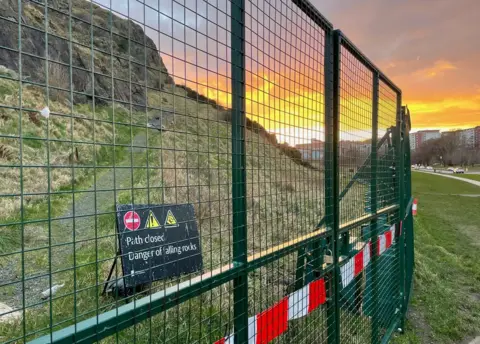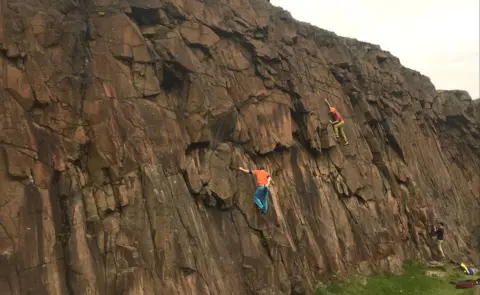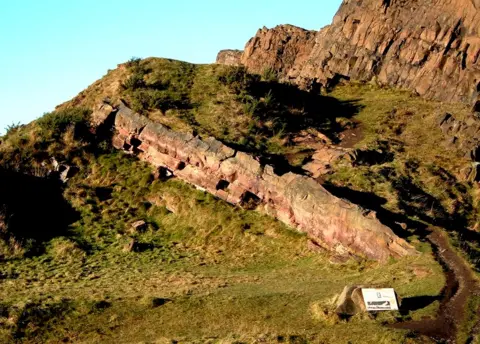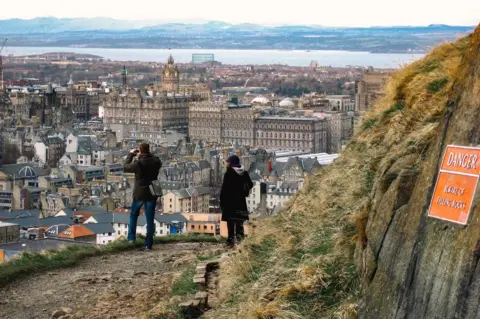Mountaineer welcomes plans to reopen Edinburgh's Radical Road
 Angie Brown
Angie BrownWorld-renowned mountaineer Stephen Venables has welcomed plans to reopen a historic path in Edinburgh, saying he is not convinced of the seriousness of the rock fall risk.
The 68-year-old climbed cliffs on the Radical Road in Holyrood Park regularly before it was closed four years ago over safety concerns.
Now site managers are looking to make a U-turn on the decision.
It follows an outcry from several organisations.
The path starts next to the Palace of Holyroodhouse where members of the Royal family stay when they are in Edinburgh.
The Radical Road runs along Salisbury Crags at Arthur's Seat, an extinct volcano that is one of Edinburgh's best-known landmarks.
It was closed in 2018 after 50 tonnes of rock fell from cliffs onto the path.

Many organisations including Ramblers Scotland, Edinburgh heritage watchdog the Cockburn Association, access group ScotWays, and Mountaineering Scotland have criticised the move.
Geologists and historians have also previously called for the path to be reopened due to the significance of the site.
Historic Environment Scotland manages the city centre park, including the kilometre-long path set high in the volcanic rock of Salisbury Crags.
It is now saying it is looking into ways to reopen the site, which had been feared would be closed permanently.
Mr Venables, who lives in Edinburgh but has climbed all over the world, told BBC Scotland a few signs warning people of the dangers was all that was needed at the path.
 Danny Carden
Danny CardenHe said: "I have seen this happening more and more all over the world. Well-meaning officials love to restrict people's access.
"This creeping health and safety is a global problem. I'm not convinced of the seriousness of the risk of rockfall at this site."
Mr Venables, who in 1988 became the first Briton to ascend the summit of Mount Everest without bottled oxygen, added that it had been a great shame when the path and cliffs were closed.
The mountaineer said: "Edinburgh is almost unique in having a mountain in its city centre, and some of the world's finest mountaineers first learned their craft here on Salisbury Crags.
"I am always highly sceptical of 'health and safety' concerns overriding the public's need to access wild country, so I am delighted to hear that Radical Road may soon be re-opened."

History of the Radical Road
 Angus Miller
Angus MillerThe Radical Road is where the founding father of geology, James Hutton, arrived at his theory of how and when the world was formed.
In the late 18th Century he found proof for his theory that the world's landscape had evolved over time, in a spot known as Hutton's Section.
The road got its name in the aftermath of the Radical War of 1820.
Also known as the Scottish Insurrection, this uprising was the result of social unrest among workers who were fed up with what they perceived to be unjust working and living conditions.
Unemployed west of Scotland weavers paved the track round Salisbury Crags, in a plan which was suggested by author Sir Walter Scott.

'Iconic path'
Brendan Paddy, Ramblers Scotland director, said: "It is encouraging to hear suggestions that the 200-year-old Radical Road may reopen.
"The iconic path offers spectacular views of our capital city and is one of the most popular ways up Arthur's Seat, Edinburgh's top attraction on TripAdvisor.
"Quite simply, Historic Environment Scotland must stop managing this world-famous geological feature like it would a crumbling historic building.
"Walkers should be advised of the risks then be allowed to make their own informed decisions, just as they do everywhere else in Scotland."
 Richard Barron
Richard BarronJames Garry, the assistant director of the Cockburn Association, said he was delighted plans were being looked into to reopen the road.
He said: "This is the most popular and traditional access through the King's Park in Holyrood.
"It is the unique experience the path provides that makes it crucial that it is reopened and accessible."
Richard Barron, chief operating officer of ScotWays - the oldest recreational access organisation in the world, said: "To reopen the Radical Road would be of great relief.
"Closing this path for good could be the thin end of the wedge for other paths, which would be a travesty."
Stuart Younie, Mountaineering Scotland CEO, said: "There is a long history of climbing on the crags as the bouldering routes there are easily accessible, and climbers are already used to managing the risks associated with climbing on natural rock."
A spokeswoman for Historic Environment Scotland said: "We hope to strike a balance between the current risk from rockfall and access that will provide benefit for all whilst meeting our statutory obligations, and we will continue to explore how we can minimise the current access restrictions on the Radical Road as part of any future proposals.
"We are reviewing how we assess and manage rock risk safety with specialists from the British Geological Survey and our specialist geotechnical engineers."
